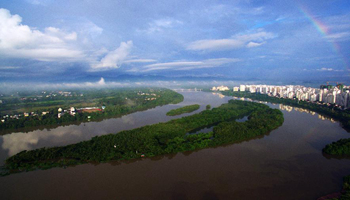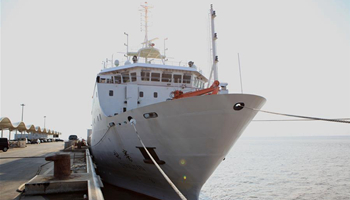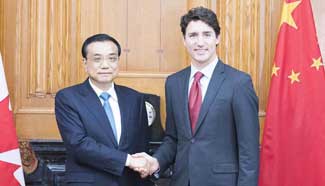UNITED NATIONS, Sept. 23 (Xinhua) -- As the annual general debate of the UN General Assembly entered its fourth day on Friday, the issues of environmental protection, terrorism, and refugees featured prominently in the speeches of world leaders who made a united call for tackling these multi-layered challenges.
Brazil's new president, Michel Temer, told the United Nations on Tuesday that his country will deposit instrument of ratification of the Paris Agreement on climate change the next day.
"We live in the same Planet. There is no plan B. We must take ambitious measures under the principle of common but differentiated responsibilities," he said.
As the world's most biodiverse country and displaying one of the world's cleanest energy matrices, Brazil is an environment powerhouse with an uncompromising commitment to the environment, he said.
The Paris Agreement on climate change has moved closer towards entry into force as 31 more countries joined the agreement on Wednesday at the UN headquarters in New York.
Through videos, the European Union, Canada, Australia and some other countries have promised to join the agreement no later than this year.
UN Secretary-General Ban Ki-moon said there are 60 parties representing over 47.5 percent greenhouse gas emissions have joined the agreement.
The Paris Agreement, adopted in December 2015, needs 55 nations that together account for 55 percent of global greenhouse gas emissions to ratify before it can formally enter into force.
To Fiji, a small island developing country, climate change has posed a real, existential threat as a warming globe brought about extreme weathers and rising sea levels.
"We are alarmed by scientific predictions that the 2 degree cap on global warming over pre-industrial levels agreed to in Paris is not enough to save us," said Fijian Prime Minister Josaia Voreqe Bainimarama on Tuesday, appealing for deeper cuts in carbon emission to reverse the current trend of global warming.
The prime minister urged the world to embrace the 1.5 degree cap so as to spare Small Island Developing States from the nightmare scenario in which a single event could wipe out our economy and set the country back for decades.
According to a monthly report released recently by the U.S. National Oceanic and Atmospheric Administration (NOAA), 2016 will be hottest year on record, with each of the first seven months setting new temperature records.
Terrorism is another topic that touched repeatedly by world leaders.
Noting some new challenges such as global terrorism, climate change, and unprecedented mass movements of people, British Prime Minister Theresa May on Tuesday called on the international community to adopt comprehensive national action plans to tackle both the causes and the symptoms of all extremism.
"These (terrorist) organizations are using our own modern banking networks against us," said May. "So we need to look at our regulations, our information sharing and using our technological capacities to get ahead of them."
"They are exploiting the internet and social media to spread an ideology that is recruiting people to their cause all over the world. So we need to tackle this ideology head-on," she added.
Speaking along similar lines, Egyptian President Abdel Fattah al-Sisi said Tuesday that the international community needs to take all possible measures to defeat terrorism and prevent it from exploiting advances in information technology.
"The world is at a crossroads; threats to international peace and security are no longer conventional, but have rather evolved to constitute a threat to the very tenets of human civilization," al-Sisi said.
As a regional power, al-Sisi said, Egypt has managed to preserve its stability in the Middle East, a region plagued by instability and bloody conflicts.
"Egypt may continue to act as an anchor of stability in the Middle East, sparing no efforts in carrying out its natural role by working with regional and international parties to restore security and stability in the region," he said.
Iraqi Prime Minister Haider Abadi said on Thursday that the international community should cooperate to besiege terrorism, dry out its financial resources, and demolish its networks and recruitment hubs.
Calling the Islamic State (IS) an adversary to Islam, Abadi also noted that terrorism will not end until the problem of radical ideology of sectarian segregation is addressed.
"There is no choice but to cooperate to win the war against terrorism," he added.
Iraqi security forces and allied units have been battling IS militants for retaking large territories in northern and western Iraq that was seized by the IS since June 2014.
The morass of the conflict in the Middle East and other areas not only fueled the rise of extremists, but spewed out a flood of refugees and migrants into neighboring countries.
On migration issue, May said the international community must ensure a managed and controlled international migration response and at the same time investing to tackle underlying drivers of displacement and migration at source.
She said there is nothing wrong with the desire to migrate for a better life, "and also that controlled, legal, safe, economic migration brings benefits to our economies."
Myanmar's State Counselor Aung San Suu Kyi said on Wednesday that lack of peace and lack of development are two main causes of the unprecedented scale of irregular migration in recent years.
Addressing the UN General Assembly high-level debate, Suu Kyi said by building peace and development, durable solutions to the migration issue can be found.
"We must not forget that migrants contribute to the economies of their host countries as well as to the global economy," she said.
This year's high-level General Assembly debate from Sept. 20-26 has gathered over 140 world leaders here in New York on a variety of issues, ranging from sustainable development, counter terrorism, and refugee and migrant crises.










